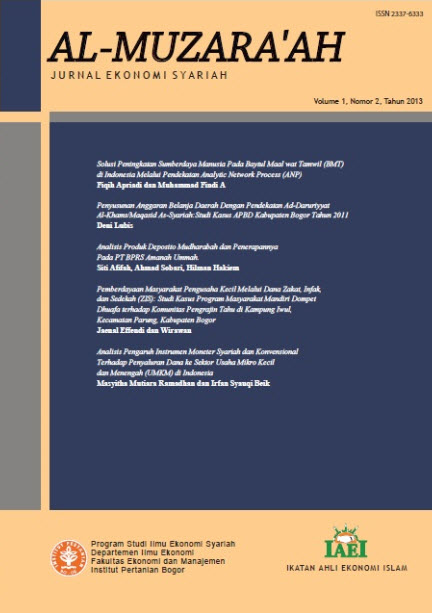Penyusunan Anggaran Belanja Daerah Dengan Pendekatan Ad-Daruriyyat Al-Khams/Maqasid As-Syariah: Studi Kasus APBD Kabupaten Bogor Tahun 2011
Main Article Content
Abstract
The welfare of people in a certain area can be observed from the income and budget allocation. If the income of the local government will be high then the local community is prosperous citizens and vice versa. Budget allocation should be considered its effectiveness whether or not it is allocated for the welfare of the local citizens. According to As-Syatibi, human being have five besic needs or called as ad- daruriyyat al – khams. They are to keep or maintan the faith (religion), to maintan life, intellect, descent, and property. The concept of five basic needs is taken from the purpose of shariah revelation ar called as Maqasid As- Shari'ah. From these five basic needs it has to be observed whether a needs is included dharuriyat (primary), hajiyyat (secondary), or tahsiniyyat (luxuries). In the budget process, the budget allocation for maintenance of religion should be the highest priority, followed by life needs, maintenance of life, maintenance of descent, and the property maintenance. Consecutively this is consistent with the Government’s vision, which is to realize Bogor as pios self dependent and culture, rich city. This vision must be reflected Bogor district budget allocation. In general, Bogor district budget has been allocated to the five basic needs, but in terms of allocation still not in line with the concept of ad- daruriyyat al – khams. It is because some of the budget posts have been covered by central government, such as religious activity post by Ministry of Religious Affairs, law enforcement post by Ministry of Law and Human Rights, and security post by police and army.
Downloads
Download data is not yet available.
Article Details
Section
Articles

This work is licensed under a Creative Commons Attribution-ShareAlike 4.0 International License.
Author(s) who published in this journal agree to following terms:
- Authors understand and agree that copyright of manuscripts published are held by Al-Muzara'ah. The statement to release the copyright to Al-Muzara'ah is stated in form CTA (link doc).
- Copyright encompass exclusive rights to reproduce, to distribute, and to sell any part of the journal articles in all form and media.
This work is licensed under a Creative Commons Attribution-ShareAlike 4.0 International License (CC BY-SA) where Authors and Readers can copy and redistribute the material in any medium or format, as well as remix, transform, and build upon the material for any purpose, but they must give appropriate credit (cite to the article or content), provide a link to the license, and indicate if changes were made. If you remix, transform, or build upon the material, you must distribute your contributions under the same license as the original.
References
Al-Quran al-Karim. 2008. Departeman Agama Republik Indonesia
Affar, Abdul Mun’im, at-Tanmiyyah wa at-Takhthit wa Taqwim al-Masyru’at fi al-iqtishad al-Islami, cet. 1, Daar-al-wafaa: 1992
[BPS] Badan Pusat Statistik Kabupaten Bogor. 2010. Hasil Sensus Penduduk Tahun 2010.
Dieter, Hans dan Mulyato sumardi, Sumber Pendapatan, Kebutuhan Pokok dan Perilaku Menyimpang. Jakarta : YIIS-Rajawali, 1982
Dunya, Syauqi Ahmad, Al-Iqtishad al-Islami, (Makah:Rabithah alam Islami, tahun 1990) (penerjemah) Ahmad Shodiq Noor, Sistem Ekonomi Islam, (Jakarta, Fikahati Anseka, 1994) Cet. 1
Frank, Goble G. Mazhab Ketiga, Psikologi Humanistik Abraham Maslow, Karnisius Yogyakarta, cet. Kedua 1991
Al-Hasyimi, Sayyid Ahmad, Syarah Mukhtarul Hadits, (pent.) KH. Moh Anwar dkk., cet, CV. Sinar Baru Bandung, 1993
Khan, M. Fahim, Essay in Islamic Economics, Islamic Economic Series-19, (The Islamic Foundation, 1995/1415H)
Pemerintah Kabupaten Bogor. 2012. “Laporan Keterangan Pertanggungjawaban (LKPJ) Bupati Kabupaten Bogor Tahun Anggaran 2011”.
Malinowski, Bronislaw, A Scientific Theory of Culture and Other Essays, London : Oxford University Press: 1969
Mannan M.A., Ekonomi Islam, Teori dan Praktek, (pent. Potan Arief Harahap) Jakarta: Intermasa, 1992
Robbins, Stephen P. & Marycoulter, Manajement (AS: 1996), Cet. Ke-5
Suleman, Narsuddin Fadhli Maula Muhammad, Ma’aayiir wa Dhamaanaat akitstismaar fii al-Iqtishad al-Islami, Risalah Doktor (tidak diterbitkan) Fakultas Syariah, Universitas Umul Quraa 1409H
Suparlan, Parsudi, Kebudayaan dan Perkembangan, Jakarta : MGMP Sosiologi dan Antropologi DKI-Jakarta. 1998
As-Syathibi, Abu Ishak, Al-Muwafaqat fii Usuli as-Syari’ah, Jilid II, al-Fikri Al-Arabi, Mesir (t.t.)
Qardhawi, Yusuf, Peran Nilai dan Moral dalam Perekonomian Islam, (Jakarta: Robbani Press 1997)
Affar, Abdul Mun’im, at-Tanmiyyah wa at-Takhthit wa Taqwim al-Masyru’at fi al-iqtishad al-Islami, cet. 1, Daar-al-wafaa: 1992
[BPS] Badan Pusat Statistik Kabupaten Bogor. 2010. Hasil Sensus Penduduk Tahun 2010.
Dieter, Hans dan Mulyato sumardi, Sumber Pendapatan, Kebutuhan Pokok dan Perilaku Menyimpang. Jakarta : YIIS-Rajawali, 1982
Dunya, Syauqi Ahmad, Al-Iqtishad al-Islami, (Makah:Rabithah alam Islami, tahun 1990) (penerjemah) Ahmad Shodiq Noor, Sistem Ekonomi Islam, (Jakarta, Fikahati Anseka, 1994) Cet. 1
Frank, Goble G. Mazhab Ketiga, Psikologi Humanistik Abraham Maslow, Karnisius Yogyakarta, cet. Kedua 1991
Al-Hasyimi, Sayyid Ahmad, Syarah Mukhtarul Hadits, (pent.) KH. Moh Anwar dkk., cet, CV. Sinar Baru Bandung, 1993
Khan, M. Fahim, Essay in Islamic Economics, Islamic Economic Series-19, (The Islamic Foundation, 1995/1415H)
Pemerintah Kabupaten Bogor. 2012. “Laporan Keterangan Pertanggungjawaban (LKPJ) Bupati Kabupaten Bogor Tahun Anggaran 2011”.
Malinowski, Bronislaw, A Scientific Theory of Culture and Other Essays, London : Oxford University Press: 1969
Mannan M.A., Ekonomi Islam, Teori dan Praktek, (pent. Potan Arief Harahap) Jakarta: Intermasa, 1992
Robbins, Stephen P. & Marycoulter, Manajement (AS: 1996), Cet. Ke-5
Suleman, Narsuddin Fadhli Maula Muhammad, Ma’aayiir wa Dhamaanaat akitstismaar fii al-Iqtishad al-Islami, Risalah Doktor (tidak diterbitkan) Fakultas Syariah, Universitas Umul Quraa 1409H
Suparlan, Parsudi, Kebudayaan dan Perkembangan, Jakarta : MGMP Sosiologi dan Antropologi DKI-Jakarta. 1998
As-Syathibi, Abu Ishak, Al-Muwafaqat fii Usuli as-Syari’ah, Jilid II, al-Fikri Al-Arabi, Mesir (t.t.)
Qardhawi, Yusuf, Peran Nilai dan Moral dalam Perekonomian Islam, (Jakarta: Robbani Press 1997)

